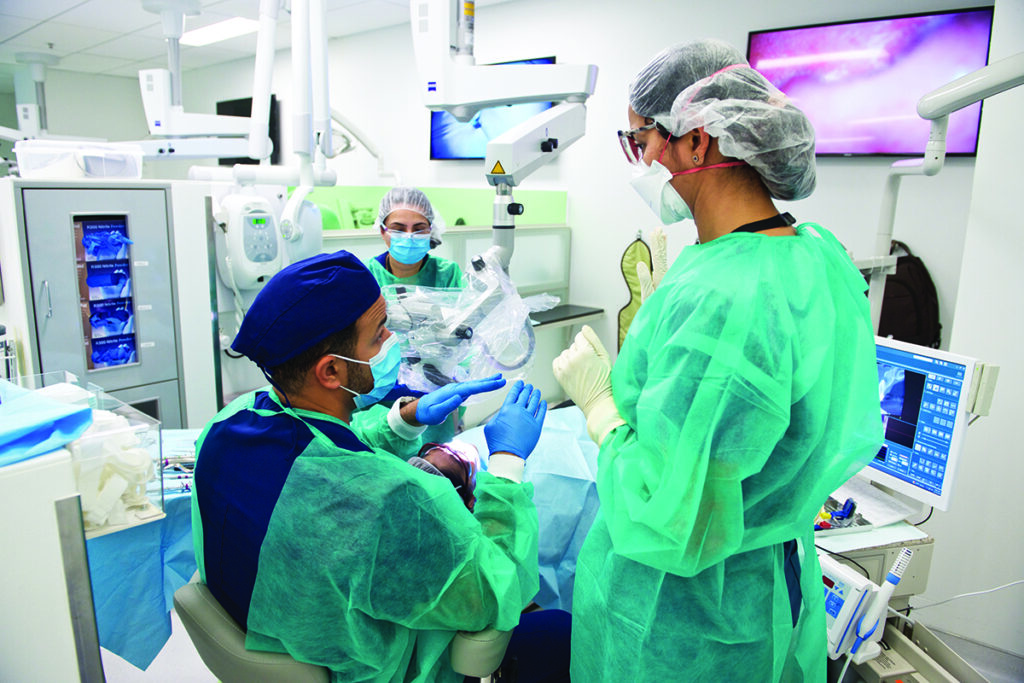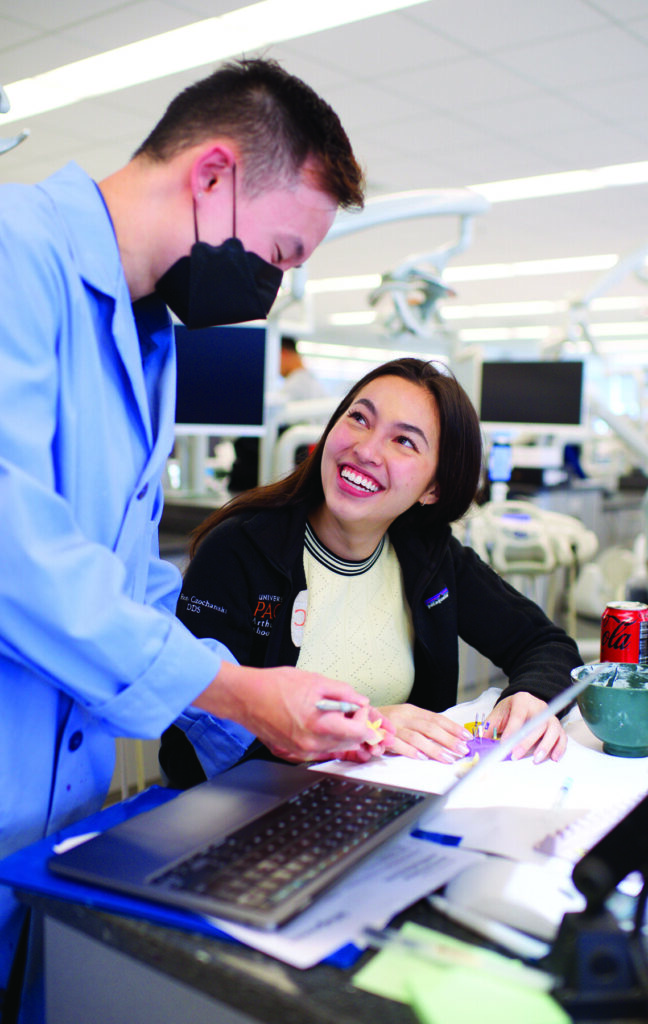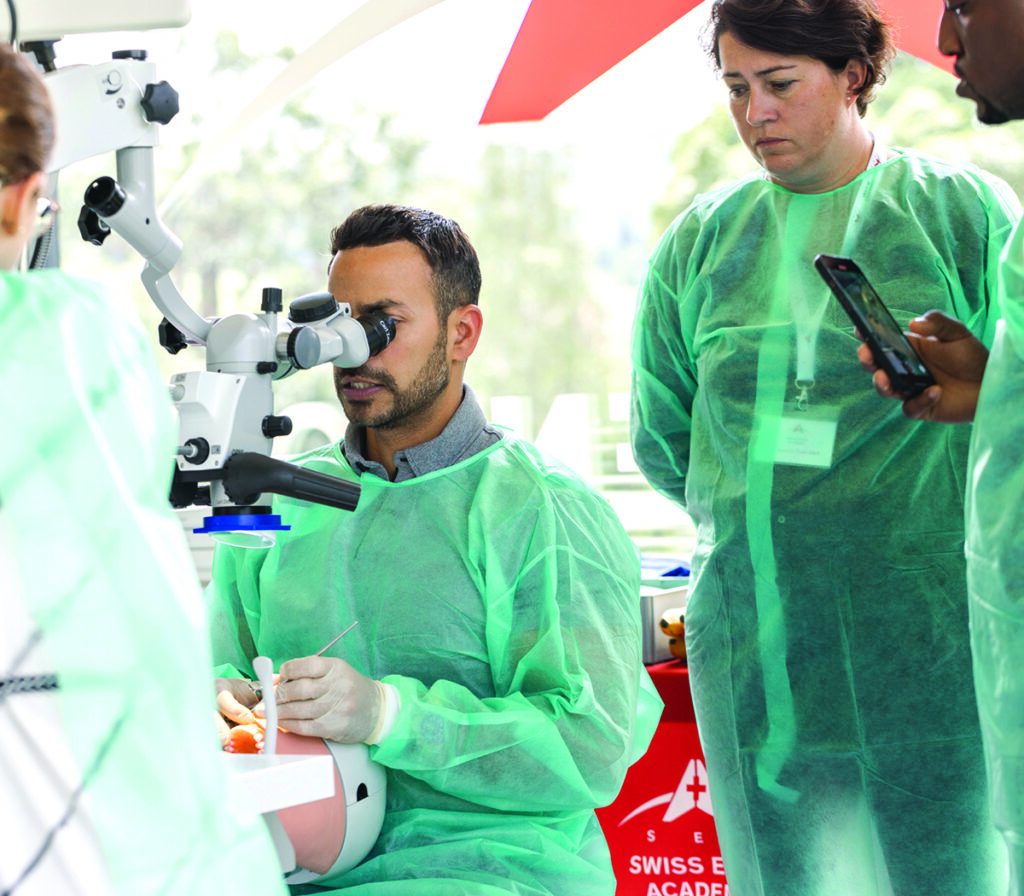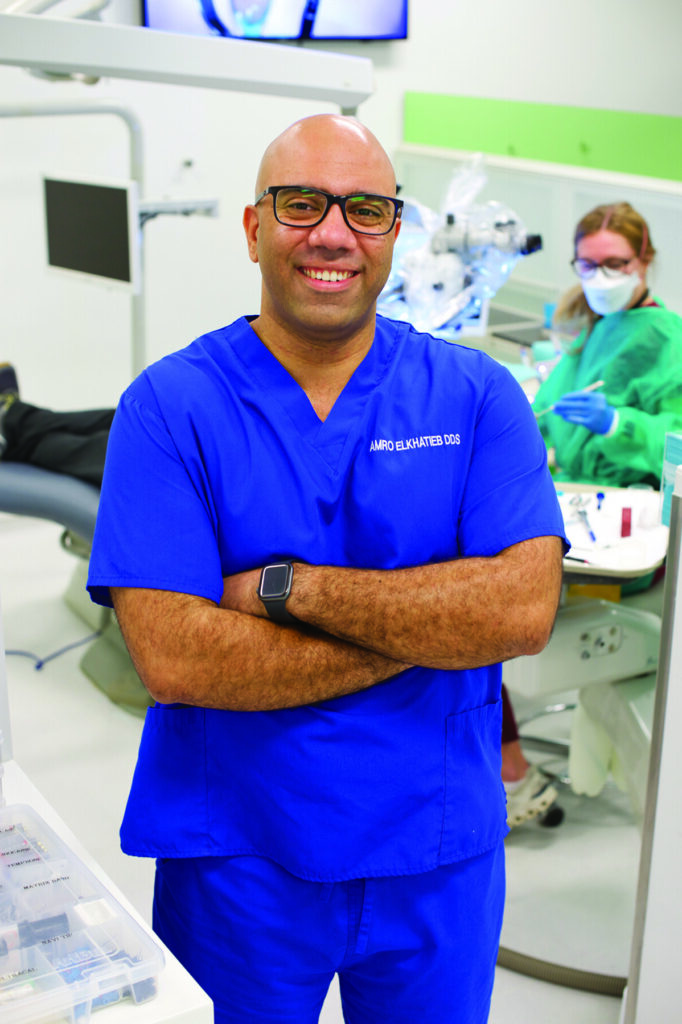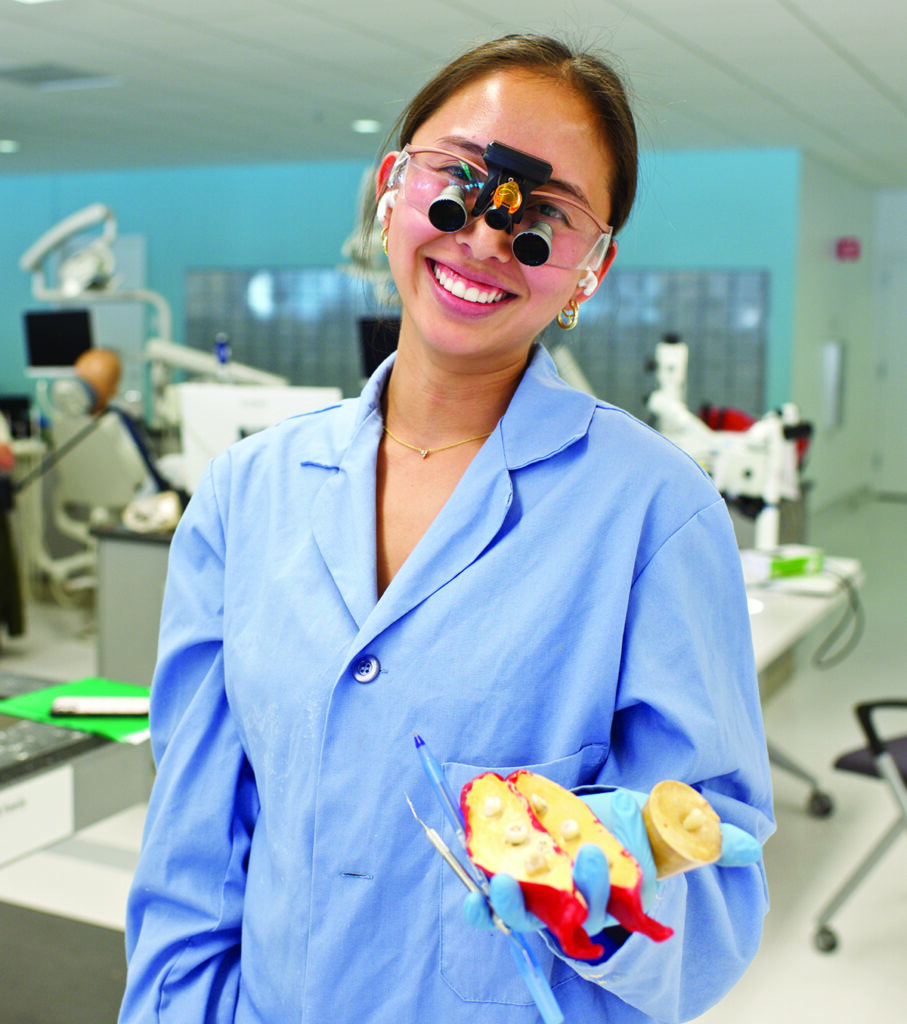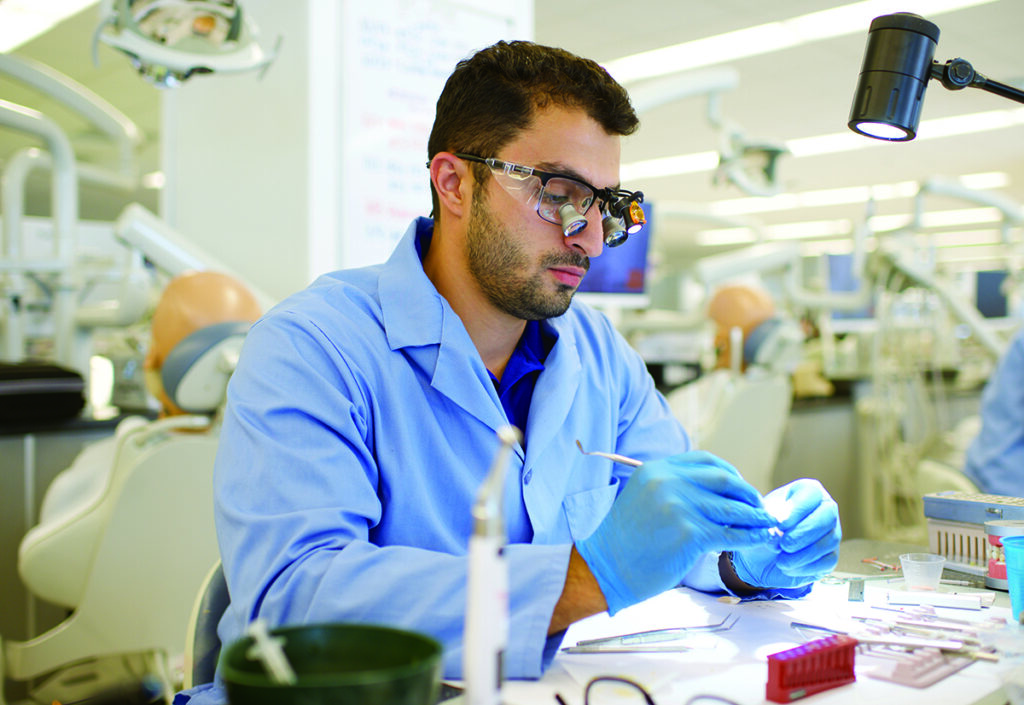By Jennifer Langham
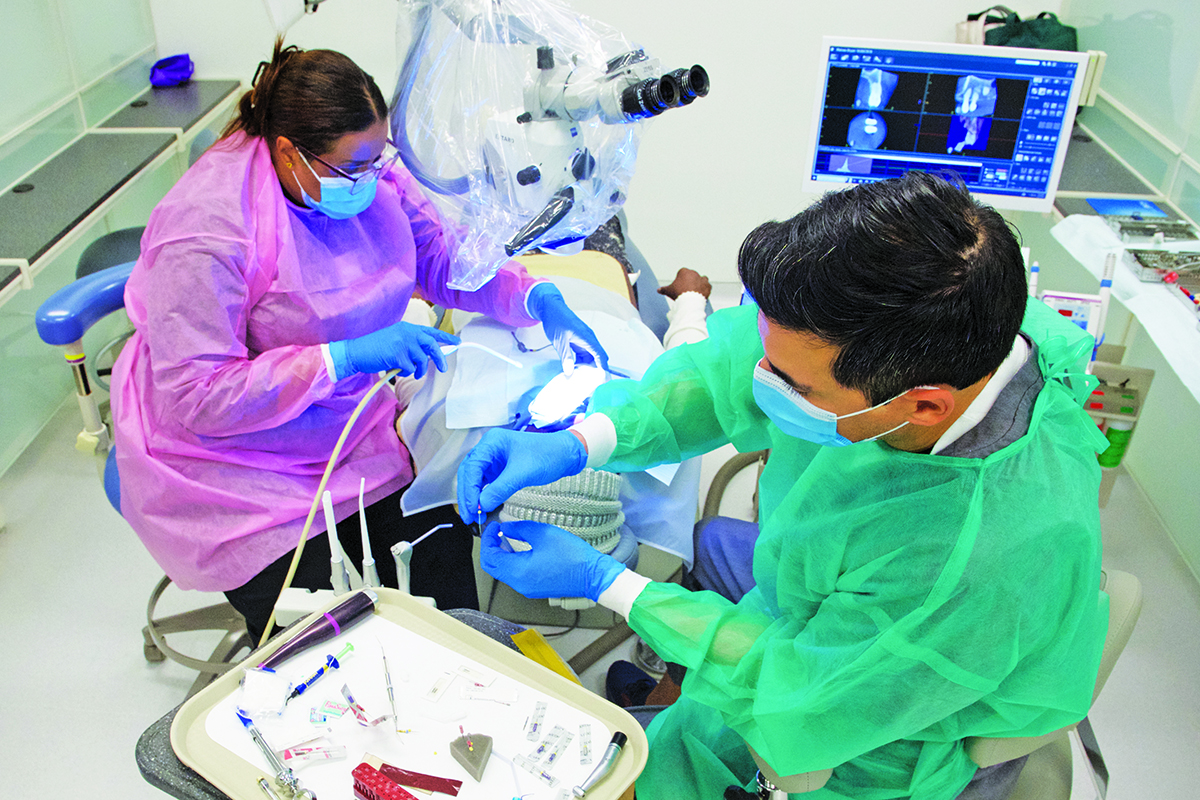
Photos by Chris Woodrow
The year 2013 was a busy time at the Arthur A. Dugoni School of Dentistry. Work was noticeably underway on the construction of the school’s downtown building, but there was also the announcement of a new, 27-month Advanced Education Program in Endodontology. A press release at the time informed readers, “The start of the program will coincide with the school’s move to its state-of-the-art campus in July 2014.”
This confluence of events meant that from the beginning, the endodontic residency program has been known for top-notch facilities, technology and equipment. But then and now, the success of the residency program has been based on its people.
Building on a Culture of Excellence
“Our terrific faculty members were ready to teach a residency program,” remembers Dr. Cindy Lyon ’86, professor and associate dean for oral health education, who was on the Curriculum Committee considering the establishment of the residency program in 2013. “Adding the advanced education program, with the opportunity to teach endodontology to both predoctoral and advanced education students, brought some additional energy to the whole dental program.”
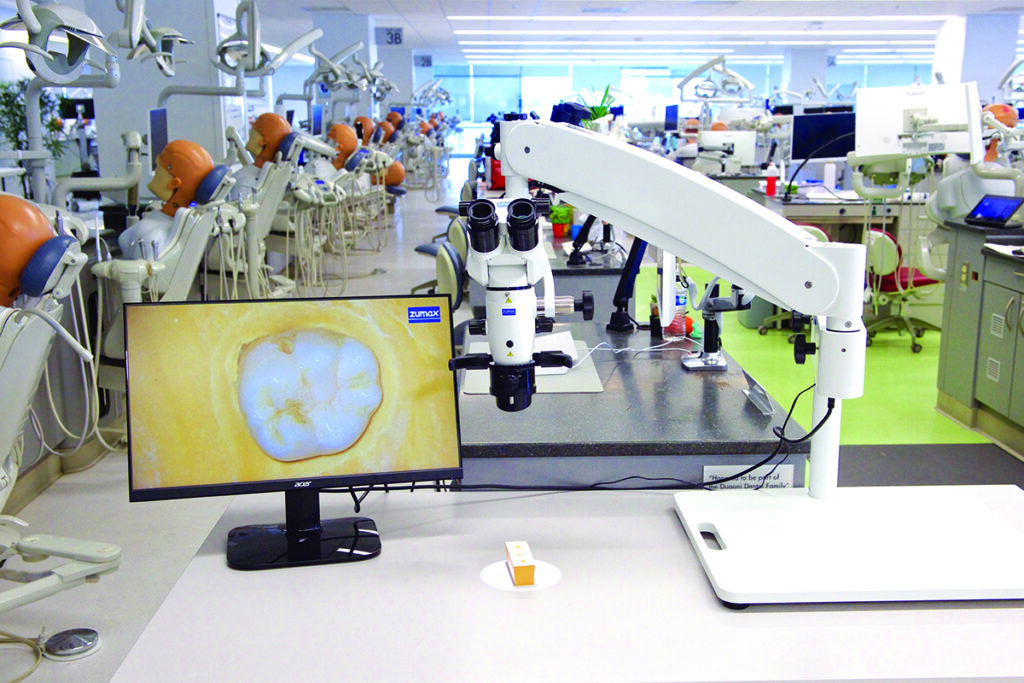
One of eight new bench microscopes in the preclinical lab 
Dr. Alan Gluskin ’72 and Dr. Michal Glenn, first-year resident
The goal of creating the program—resulting in a master of science degree and certificate in endodontics—was to leverage these skilled faculty to model the latest technology and techniques in endodontic care for the entire dental program. In addition, the program would integrate the second-year residents within the intake and emergency services of the group practice model, providing care for patients with more challenging dental issues.
Lyon names some of the luminaries in the endodontic field who have taught at the dental school: Dr. Ove Peters, who helped start the endodontic residency program and is globally recognized for his research and for translational technology; Dr. Stephen Cohen, author of 10 editions of the definitive endodontic text Pathways of the Pulp; Dr. Alan Gluskin ’72, long-time chair of the school’s Department of Endodontics, who served as president of the American Association of Endodontists (AAE) in 2020; and now Dr. Adham Azim as chair.
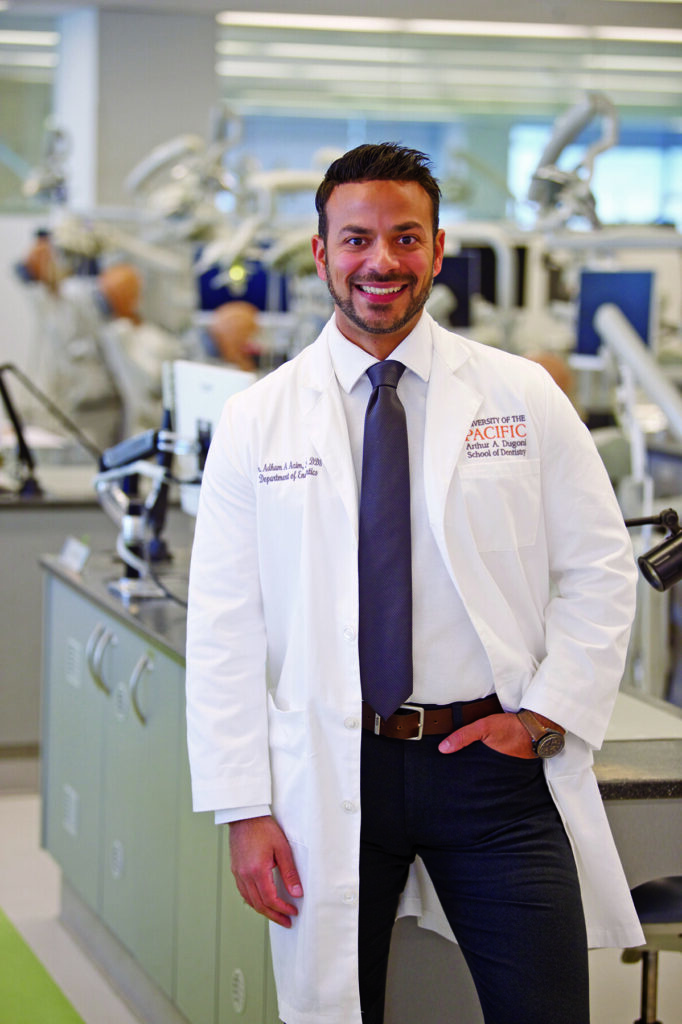
Dr. Adham Azim, chair of the Department of Endodontics
“There has been a nice handoff between leaders at multiple stages of the endodontic program, and each has brought something new to the school,” Lyon notes.
Since 2021, the department has been led by Dr. Adham A. Azim, associate professor and the Dr. Earl R. and Tannia Hodges Endowed Chair in Endodontics. Azim has overseen an addition of almost $1 million in new equipment to the department for both the predoctoral and residency programs: new bench microscopes for teaching DDS students in the preclinical lab, additional endodontic motor and obturation systems and new microscopes on all predoc endo chairs, along with sensors and ultrasonic units.
Under Azim’s leadership, the school has also made a full curriculum revision, moving classes to different quarters and updating the curriculum itself, thus gaining more hours with the students to enhance their mastery of the specialty. “I can’t say enough about the support from and role of the school’s administration in making these changes,” says Azim. “Until I came to the Dugoni School, I couldn’t really grasp the importance of the culture here. Administration, faculty and students care about coming here and contributing all they can. Students feel that they have a lifelong relationship with the school—it’s not just a place they’re spending three years and then leaving.”
Learning from Mentors
Dr. Mia Tittle ’18, ’22 Endo would agree with this description of the culture at the school. Tittle’s father, Dr. Kenneth Tittle ’89, an endodontist and part-time faculty member, was a role model for her, but it was mentorship from professors such as Drs. Gluskin ’72, Gordon Lai ’20 Endo, Johnah Galicia and the late Ray Scott ’80 who inspired her to pursue endodontics as a specialty.
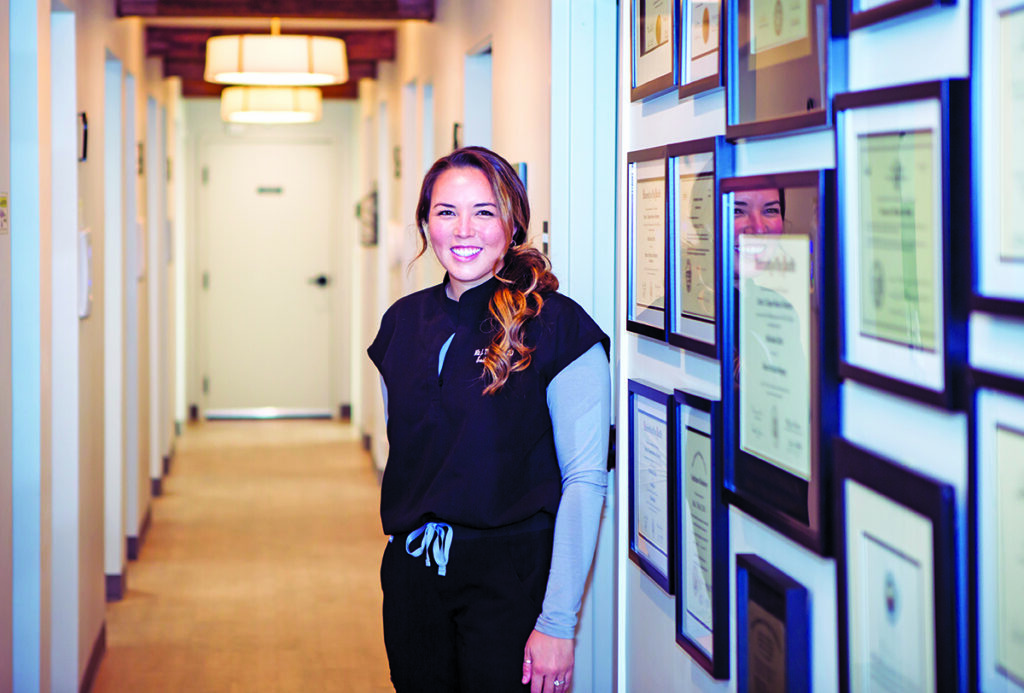
Dr. Mia Tittle ’18, ’22 Endo. Photo by Rosie Fowler
“Almost every patient who comes into our endodontics practice is in pain,” says Tittle, “and I really like the challenge of meeting someone, getting to know them, making them feel safe and getting them out of pain, all in one visit. It’s especially rewarding.”
You learn to trust your gut and your training, and it’s very satisfying.
Also gratifying for Tittle is the “extremely micro” nature of endodontics. “Many procedures in general dentistry involve working in very small spaces, but in endodontics it’s even smaller—using microscopes with up to 30 times magnification and instruments that are fractions of millimeters in diameter—so it’s focused work. You learn to trust your gut and your training, and it’s very satisfying,” she says.
As both a former DDS student and resident, Tittle saw how the endodontic residency program enhanced the dental school as a whole, providing DDS students with opportunities to learn from the residents and to explore endodontics. “It’s easy for students to jump in on a research project or to shadow residents in the clinic,” she says. “And it’s very helpful for predoc students even if they’re not interested in specializing to learn how endodontists do things.”
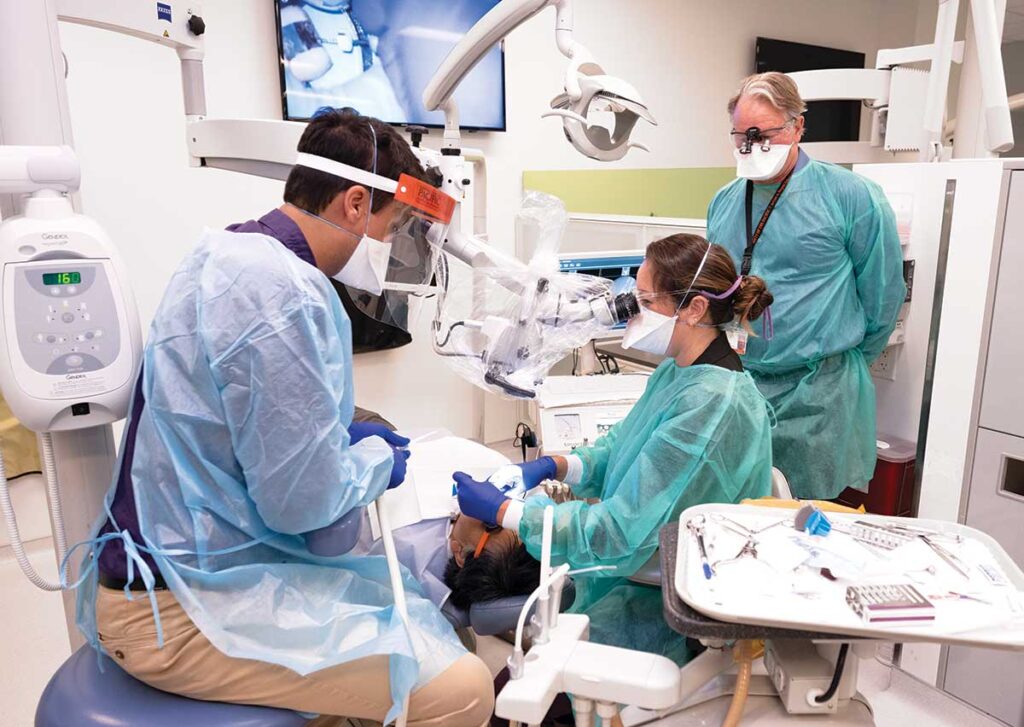
Dr. Mia Tittle ’18, ’22 Endo with her father and faculty member Dr. Kenneth Tittle ’89 (right) 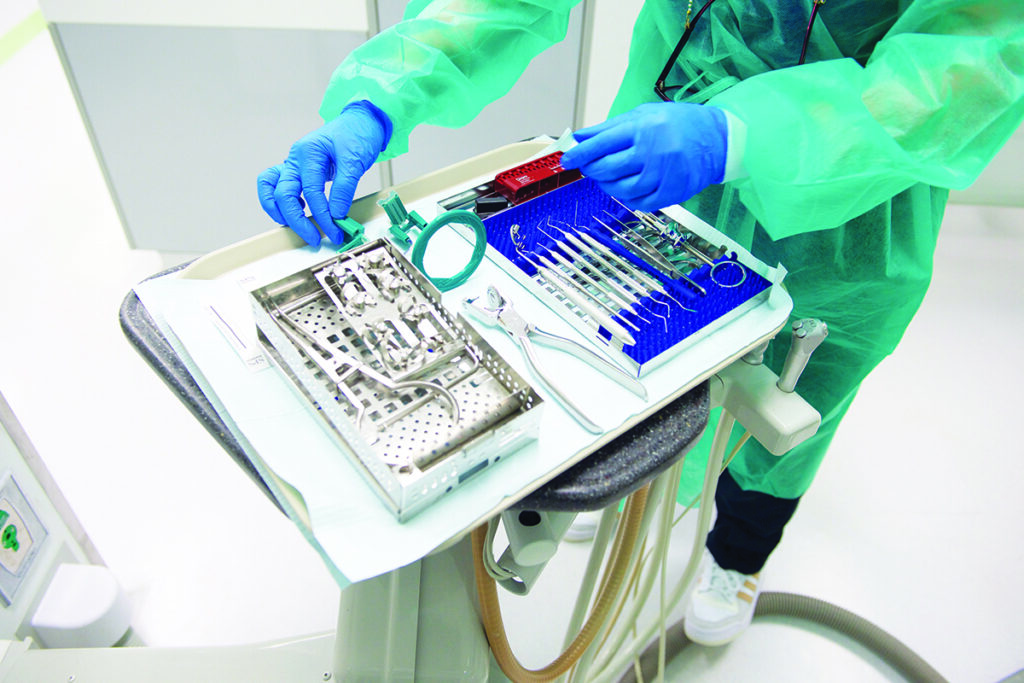
Photo by Chris Woodrow
Now in practice with her father in Pleasant Hill, California, Tittle noticed the increased presence of the dental school’s endodontic program at this year’s AAE conference, where the program had its first reception with former residents and even prospective students stopping by. “It was great to see how many students were really interested in coming to the Dugoni School, and I think it boosts the reputation of the entire dental school to have a strong endodontic program,” she says.
Boosting Research and Global Reach
One important component of the residency program’s mission and reputation over the decade has been a commitment to research. Lyon says that this was by design. “Research and shared scholarship have always been important at the dental school, and the endodontic program was created with these goals in mind,” says Lyon. “The program will continue to excel in research with the great team we have in place, comprising longstanding faculty members as well as new additions.”
The dental school recently hired Dr. Prasanna Neelakatan as the endodontic program’s dedicated research director. Neelakatan joins the Dugoni School of Dentistry from Hong Kong University, one of the world’s top-ranked dental schools, where he was assistant dean of research. He will now oversee the research work by endodontic residents. “Dr. Neelakatan is really going to boost our research potential and the ability of our residents to contribute to research literature,” says Azim.
“With our expertise, we can shape how endodontics is practiced worldwide.”
The global reach of the Dugoni School of Dentistry’s endodontic program has also been expanded through a two-year international endodontic program facilitated by the Division of Continuing Dental Education. The program is geared primarily toward international dentists in Europe. By delivering structured online content as well as in-person coursework and by overseeing clinical work, this non-degree granting program aims to elevate the practice of endodontics on a global scale.
“We focus on evidence-based dentistry, and our expectation is that dentists who complete this program will practice endodontics at the highest level possible.” Azim explains. He notes that the online content is so well respected that many endodontic departments in this country are using it to train their residents.
“We also have the best endodontics surgical training in the country,” Azim continues. “This is an area that is often a hurdle for many endodontists everywhere. With our expertise, we can shape how endodontics is practiced worldwide.”
Diving Deep Into the Field—And Paying It Forward
It was the opportunity to expand his own skills that inspired Dr. Amro Elkhatieb ’16 IDS and current endodontic resident, to return to the dental school. He says the program “takes a deep dive” into endodontics for practicing dentists like himself.
“We’re focusing on the science behind endodontics and the research that has been done, and we’re surrounded by professors and professionals who are big names in the field of endodontics—who have left their mark in research, in teaching and in the development of new materials in the field,” Elkhatieb says. “So we’re not just doing the procedures, but learning what will make the work successful.”
He points specifically to surgical techniques such as apicoectomy, autotransplantation and root amputations as some of the newer techniques he’s learning in the residency program. “Some of the techniques and procedures we are doing right now are different from how it was done even 10 years ago, so the technology and the innovation in this field is just amazing,” he says.
“We’re not just doing the procedures, but learning what will make the work successful.”
Currently, Elkhatieb serves as a member of the Alumni Association Board of Directors and as a District 13 delegate for the American Dental Association. When he completes the residency and can practice as an endodontist, Elkhatieb also wants to speak internationally on the topic and, importantly, teach at the Dugoni School of Dentistry, as he has seen many of his fellow alumni do. He understands why. “Investing a day a week in teaching at the dental school is investing in the field, and helps you grow as a clinician and as a human being, which I think is part of the legacy that Dr. Arthur Dugoni left,” he says.
Moving Into the Future
An exciting recent addition to the school’s Department of Endodontics is an Endodontics-PhD program in collaboration with University of the Pacific, Thomas J. Long School of Pharmacy. During the five-year program, students will earn a certificate in endodontics, a master’s degree in dentistry and a PhD in chemistry from the pharmacy school. The first student accepted into the program will start in 2024.
“We are one of only four dental schools to have this combined Endo-PhD program,” says Azim, “and I think it will help boost our research to a very high level.”
The Dugoni School of Dentistry has also received approval from the American Dental Association’s Commission on Dental Accreditation to increase the number of students in its endodontic residency program, from six total students to eight (four residents per class), increasing the ability to support the community and treat more patients.
Earlier this year at the AAE conference, the residency program won its first AAE award, achieving fourth place in a table clinic by first-year resident Dr. Ankita Kathpalia. Additionally, for the first time, the dental school had four presentations by residents.
“We are one of only four dental schools to have this combined Endo-PhD program, and I think it will help boost our research to a very high level.”
Azim, who himself was recognized at the AAE meeting with the Edward M. Osetek Award for his outstanding teaching, is excited about what these developments mean for the next 10 years of the endodontic residency program at the Dugoni School of Dentistry.
“Without a doubt, I can see us leading the country, and even leading worldwide, in this specialty,” he says. “We have an excellent team of clinicians, researchers and educators who work well together and support each other, and I feel very fortunate to work with them and to lead this department.”
Jennifer Langham is a contributor to Contact Point and other University of the Pacific publications.
